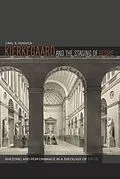Theology in the modern era often assumes that the consummate form of theological discourse is objective proseGCoignoring or condemning apophatic traditions and the spiritual eros that drives them. For too long, Kierkegaard has been read along these lines as a progenitor of twentieth-century neo-orthodoxy and a stern critic of the erotic in all its forms. In contrast, Hughes argues that Kierkegaard envisions faith fundamentally as a form of infinite, insatiable eros. He depicts the essential purpose of KierkegaardGCOs writing as to elicit ever-greater spiritual desire, not to provide the satisfactions of doctrine or knowledge.HughesGs argument revolves around close readings of provocative, disparate, and (in many cases) little-known Kierkegaardian texts. The thread connecting all of these texts is that they each conjure up some sort of performative Gstage setting,G which they invite readers to enter. By analyzing the theological function of these texts, the book sheds new light on the role of the aesthetic in KierkegaardGs authorship, his surprising affinity for liturgy and sacrament, and his overarching effort to conjoin eros for God with this-worldly love.
